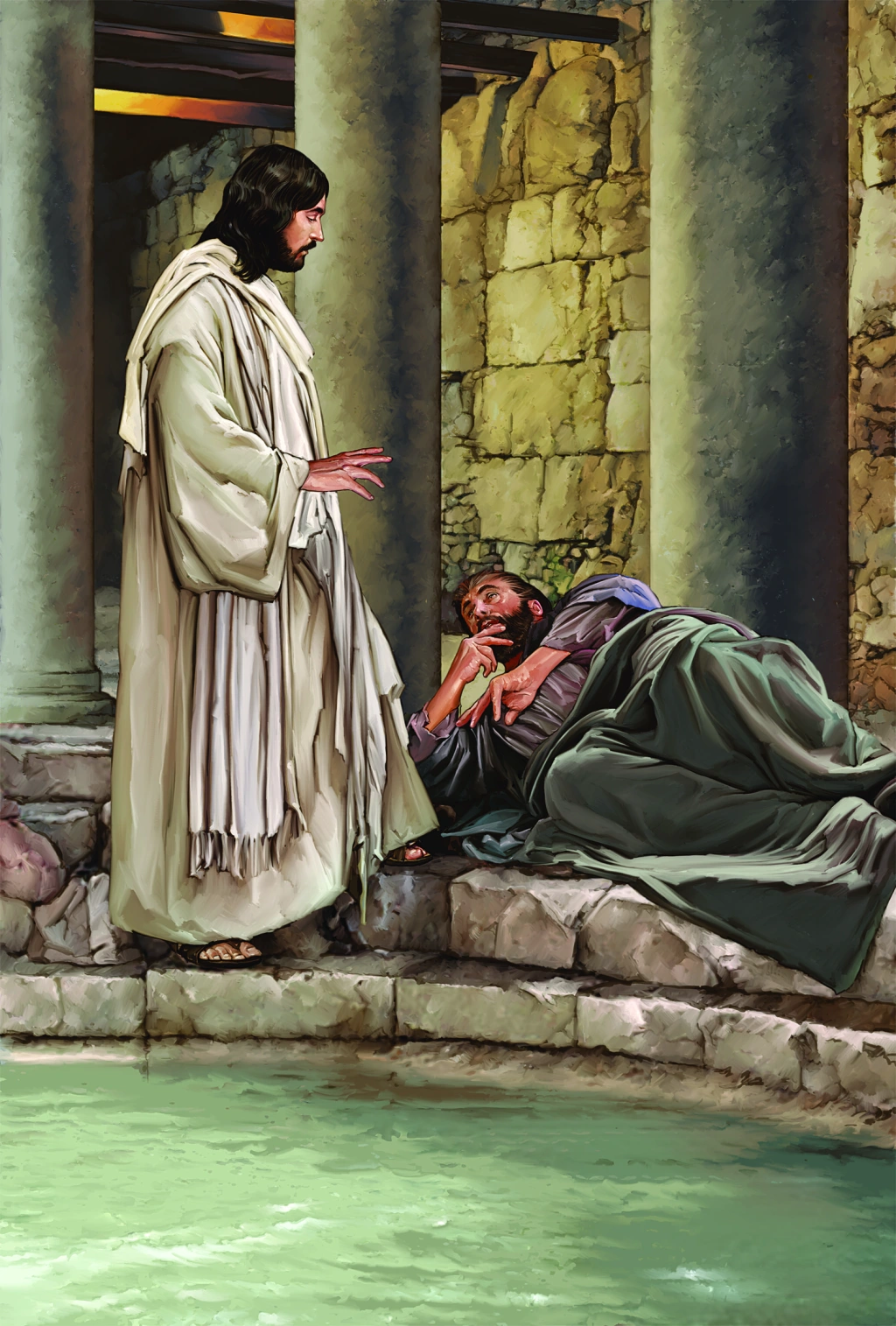 Repay Evil With Blessings
Repay Evil With Blessings
Nabal was asked to repay good done for him with blessings, and he failed to do what seems natural and reasonable. Jesus taught His followers to take an additional step – to repay evil with blessings! Unassisted human beings can’t do this, but a gift from the Spirit that offers a glimpse of God’s character makes it possible.
John Selwyn 1844-1898), who became bishop of the Melansian Mission in the South Pacific at the age of thirty, had been known for his boxing skill in his college days at Eton and Cambridge. One day he had to chide an islander who had a temper. Unhappy with what Selwyn said, the islander clenched his fist and struck Selwyn in the face. The bishop, who was still very strong, could have knocked the islander down, but he didn’t retaliate. Instead, he kept looking at his attacker’s face with serenity. The aggressor was so ashamed of himself that he ran away into the jungle.
The incident passed without much notice; but years later, when Selwyn had returned to England, the man who had struck him came to the bishop who had taken Selwyn’s place to confess his faith and be baptized. When he was asked what new name he wished to have, he responded, “John Selwyn, for he taught me what Jesus is like.”
We can learn more of this principle of repaying evil or insult with blessing from how David related to King Saul, who repeatedly tried to kill him. On one occasion, Saul went into a cave to relieve himself – the very cave in which David and his men were hiding. David’s men wanted to kill Saul, but David prevented them from harming him. Moments later, Saul and David had a healing encounter just outside the cave. David explained his motives to Saul, and Saul wept as he recognized his mistake.
Unfortunately, this reconciliation didn’t last long. Soon Saul and three thousand of his men were searching for David again. One night, David and one of his leaders, Abishai, infiltrated Saul’s sleeping army and made it all the way to Saul’s bedside. They could have killed him then and there, but David told Abishai, Don’t destroy him! . . . The LORD himself will strike him; either his time will come and he will die, or he will go into battle and perish. But the LORD forbid that I should lay a hand on the LORD’S anointed” (I Samuel 26:9-11).
What a beautiful attitude David had toward the man who was trying to kill him! How different would be the quality of our relationships if we would let God take whatever revenge might be needed, and in the meantime, just like David we would continue our attempts to make peace.
Forgiveness
Forgiveness is another aspect of God’s nature, which He will supply to His children so they can build better relationships. Forgiveness is among the “techniques” currently recommended in spiritual and religious counseling – together with prayer, reading of sacred passages, singing, worshipping, journaling, and so forth. Psychology hasn’t always included forgiveness as a support for healing. However nonreligious as well as religious counselors now consider it to be a legitimate tool. The professional literature often contains argumentation for forgiveness.
Forgiveness enhances positive feelings, helps people put aside issues and troubles, favors the restoration of lost relationships, and helps unload a heavy psychological burden of hostility. (However, secular psychologists carefully avoid the term sin because secular psychology still excludes that term!) Now forgiveness is considered to be a valid option when a spouse is abandoned for another partner, an employee is wrongfully dismissed, one’s reputation is ruined through gossip, or someone is victim of a financial scam. It makes sense. People realize that holding grudges and fighting back is quite expensive in terms of mental health and well-being and usually doesn’t solve anything to provide any other benefit than the dubious one of getting even.
But there is something even greater than preserving mental health. Scripture encourages us to practice forgiveness because it makes us more like Jesus. “Be kind and compassionate to one another, forgive each other, just as in Christ God forgave you” (Ephesians 4:32).
A true and beautiful story of forgiveness is that of Jo Beery. Her father, and Sir Anthony Berry, a member of the British parliament, was killed by an IRA bomb in 1984, together with four other people. The man responsible for the attach was Patrick Magee, who served fourteen years in jail before being released in 1999 under the terms of the 1998 Good Friday agreement.
Jo met Patrick in 2000. They talked for three hours, and then Patrick said, “I have never met anyone like you before. I don’t know what to say. I want to hear your pain.” They had other opportunities to meet and deepen their friendship. Patrick expressed remorse for the innocent lives that were lost as a result of his violence, and Jo came to understand much better the life Patrick had led and how he ended up doing what he did. Their friendship has not only been healing to both of them, but they have become agents of action for peace. They have spoken to young people in Austria, Israel, South Africa, and Spain about peace and forgiveness. In October 2009, they gave their testimony at the British parliament as part of a program on forgiveness.
The last moments in Jesus’ life show us the supreme example of his forgiveness. Jesus prayed, “Father forgive them, for they do not know what they are doing” (Luke 23:34). All heaven was filled with wonder when the prayer of Christ was offered in the midst of His terrible suffering.
Sometimes one may think that forgiveness is virtually impossible to grant, and indeed that is the case, for there is too much selfishness in the human heart. But forgiving people even heinous wrongs they have committed against us is possible when the Holy Spirit removes our hearts of stone and gives us hearts of flesh (see Ezekiel 36:26).
Confession and Support At Church
I have a friend that grew up as a Catholic and attending Catholic schools, so confession was part of his growing years. He states, “It would have been much simpler to confess to God than to follow the doctrine of the confessional, which was based on a twisted interpretation of James 5:16, “Therefore confess your sins to each other.” But at that time, the confessional was all that I knew. So once a week, we boys were taken to the chapel to confess. It was a bit awkward the first few times, but one gets used to it.
Then a rumor started that the priest told the principal whatever sins we confessed. When the principal heard about the rumor, he was shocked and decided that he would bring in two more priests on confession day to guarantee the secrecy of the confessional. At first many of the pupils went to the new priests, but that choice soon became unpopular, for those priests assigned time-consuming penances. Within a few weeks, our own in-house priest had all the boys back again because he systematically assigned just give Hail Mary’s (which literally took only forty-five seconds to chant) as penance for any sin we committed.”
My friend continued by saying, “My understanding of James 5:16 is much more meaningful now. This verse tells me that if I offend my neighbor, I am required to confess to him or her in order to secure forgiveness and restore the relationship. Disclosing my trespasses to my neighbor bring maturity to our relationship. One of the greatest needs human being have is to talk with someone who cares. The caring listener has the tremendous privilege of empathizing and providing support. The exchange of confession and forgiveness relieves emotional burdens and establishes a deeper level of mutual commitment that makes the relationship safer and more profound and lasting.”
However, we must remember that not everyone lives by the ethics of confidentiality. Unfortunately, it isn’t unusual for people to share confided secrets with their friends and fellow church members. This can produce a great deal of pain. Thus, we need to trust only those people who have demonstrated unquestionable discretion. In any case, fervent prayer can bring relief to the soul with zero risk of breaching the bond of confidentiality.
Let’s look again at the golden rule: “In everything, do to others what you would have them do to you” (Matthew 7:12). This principle is a priceless jewel for social relationships. It is positive, universal, based on love, and stretches above and beyond human law. It guarantees optimal interactions. However, we need divine help to put this divine principle into practice.
The story is told of two American Indians who were sitting by a fire on a placid evening, Chief Teedyuscung of the Delaware’s and an unnamed close friend of his. For some time, they sat together without saying much, each of them reflecting on his own concerns. The friend was thinking of interpersonal problems and remembered he had once heard of the Christian golden rule. He turned to Teedyuscung and said, “Chief, once I heard a principle of excellence and great usefulness.”
Teedyuscung raised his open hand to stop his friend from continuing. Then he said, “Do not tell me of the excellence or praises of that principle. Just say it to me, and I will tell you if it is trustworthy.
So, in plain and brief terms, his friend explained the golden rule to Teedyuscung. The chief immediately exclaimed, “That’s impossible!” Then the two men sat in quietness for several minutes.
Eventually Teedyuscung broke the silence. He said, “I have thought of that golden rule, and I say that if the Great Spirit that created man would give him a new heart, then it would be possible!”
If you don’t know what to do about an issue you have with someone, run your question through the simple test of the golden rule: “If I were in his/her place, what would I prefer to be done? What would I not like to be done? Then ask God for strength, wisdom, and guidance on what to do.




8 responses to “Biblical, Mental and Emotional Health”
I hope u don’t mind all my replies Forgive me if is too much Nd, I mean it.
LikeLike
Patrizia,
You are free to comment as often as you like. You are certainly not a pest and I enjoy conversing with you.
Blessings,
Pastor Lester
LikeLiked by 1 person
So Very true as usual is the Forgiveness that is also very important. I forgave all the molesters and people that stole from us. I am saying this not to show off but to reinforce what you said about forgiveness. My problem is still taking things personally then, thank God I forgive. I am far from being where I would like to be but I am, where God wants me at this time. Thank you, Pastor. There is much more you wrote and I will read it again soon.
LikeLike
Hi Patrizia,
It is truly wonderful that we serve a heavenly Father that can heal us and forgive us.
We often misunderstand each other and as Christ forgives us, we should forgive each other. Sometimes that is easier said than done, but with God’s grace and love we can forgive as Christ has forgiven us.
Blessings My Friend
Pastor Lester
LikeLiked by 1 person
Yes Pastor, Forgiveness is only real by the power of the Holy Spirit and the Word of God.
LikeLike
do you also have a Church you teach in or Pastor?
LikeLike
Yes I do. I am a Lay Pastor for the Minnesota Conference of SDA that serves a congregation of 230 members in Brooklyn Park Minnesota. I preach at what I call my home church once a month and in other churches in the area from at least once sometimes twice a month. I am considered the teaching Pastor as I teach on Wednesday evenings, Saturday Mornings, and in a local Prison two Saturday afternoons a month. You may be asking yourself, “what is a Lay Pastor?” I have all the rights and privileges of a Senior Pastor, but do not have a license to marry anyone. I have conducted funerals and I baptized people. I am considered a volunteer so I have a second (or real) job to pay the bills. In all, I average about 25 hours a week in ministry to the congregation and another 40 to my second job. That does not count time spent preparing to teach or preach or contributing to this blog.
Please forgive me if this sounded like I am boasting, that was not my purpose, I am truly happy to serve and blessed by helping others. There are six of us Lay Pastors spread out across the state of Minnesota assisting in different churches. The only reason we are considered Lay Pastors and not fulltime pastors is financial, the conference cannot afford to higher us full time, so we are trained and as pastors and volunteer of our time and talents in service to our Lord.
I hope this answers your question.
Blessings,
Pastor Lester
LikeLiked by 1 person
Thank you very much and it is an amazing thing you do especially the Prison Ministry. I am impressed LOL but, I know you are not boasting. My spirit and the discernment God gave me would have told me otherwise. Thank you for ALWAYS take the time to reply in details to my sometimes silly questions. May The Lord Jesus keep His Spirit and Blessing on you always, God IS with you in us at all times. Somedays I think I am alone but, if I start thanking Him I feel better almost right away. Looking forward to ask more question since you are very patient Pastor.Yes you answered all my questions.
Pat.
LikeLike